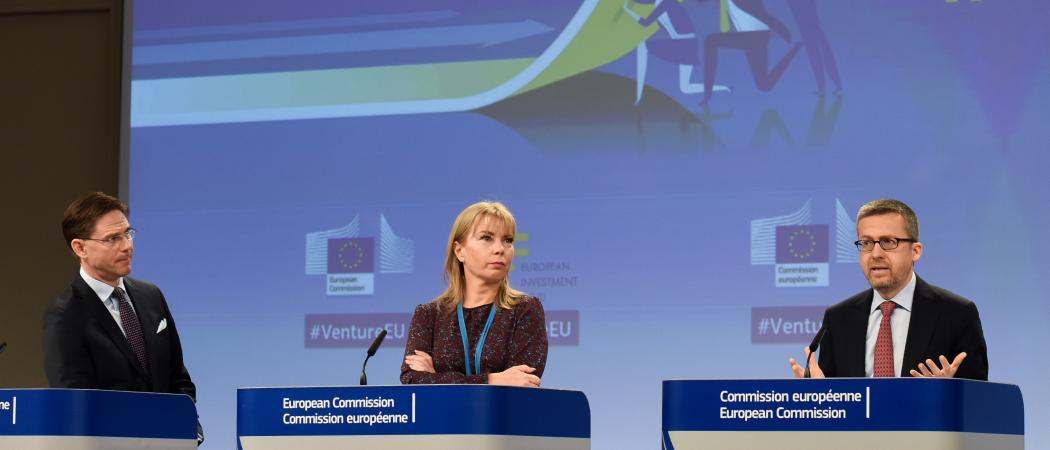New investment vehicle seeded with €410M of public money aims to attract pension funds and sovereign wealth funds to back early-stage companies and help them reach €1B ‘unicorn’ status in Europe

EU commissioners Jyrki Katainen, Elżbieta Bieńkowska and Carlos Moedas. Photo: European Commission
The European Commission has named six fund managers to run VentureEU, a new investment vehicle set up to attract capital to promising technology companies, with the aim of keeping them in Europe, rather than reaching €1 billion valuations in the US or elsewhere.
Aberdeen Standard Investments, Axon Partners Group, Isomer Capital, LGT, Lombard Odier Asset Management and Schroder Adveq will register their new funds in Luxembourg, the largest hub for investment funds in the world after the US. The location allows EU officials to Brexit-proof the scheme, since London-based Isomer Capital would otherwise not be certain of retaining access to EU money when the UK leaves next year.
With seed capital of €410 million from the EU common budget, the six new funds have a brief to raise up to €2.1 billion in public and private investment, which the EU says should eventually build to €6.5 billion.
The EU contribution will draw money from Horizon 2020, the European Fund for Strategic Investments, COSME and the EIF.
The six investors will put money into a selection of VC funds that have investments in at least four European countries, creating so-called fund-of-funds.
These investee funds will in turn sink money into a range of start-ups and bigger companies – the Commission is targeting at least 1,500 – in sectors such as information and communications technology, life sciences and energy.
Europe’s biggest VC player, the European Investment Fund, which invests with member states’ money, will be overall coordinator.
The goal is to double VC funds across Europe and make them more attractive to pension funds, sovereign wealth funds and academic endowments, which often see venture capital as too risky and growing private companies to €1 billion unicorn status as requiring long term commitments.
The scheme was first suggested by research commissioner Carlos Moedas in 2015. Now, buoyed by the money-raising success of the Juncker Plan, the EU hopes to repeat the trick in Europe’s meagre VC market.
“The pool of venture capital in Europe is too small. We are losing potential unicorns,” said Elżbieta Bieńkowska, commissioner for internal market and industry.
There are 20 private companies valued at US$ 1 billion or more in Europe, while there are 106 in the US and 50 in China.
In 2016, venture capitalists invested about €6.5 billion in the EU compared to €39.4 billion in the US.
The average fund in Europe is around €56 million, while in the US, it is three times this amount. Funds need to be able to raise at least €150 million to attract large private investors, according to InvestEU, an association representing European investors.
Catching up with US
Expecting the private sector to grow the pool of venture capital on its own does not work, according to the EU. “It has not been [mobilising money]. Since 2008, private sector investors have slashed their VC investments in both relative and absolute terms.”
Over the same time, government agencies have more than doubled their investments in VC funds. When the government puts money in first this is generally seen as a good deal for the private sector, which is more likely to follow with its own cash.
Europe’s 800-odd VC funds are also heavily concentrated, with the Commission’s analysis showing that around 90 per cent of all EU venture capital is raised in eight countries: the UK, Germany, France, Sweden, the Netherlands, Finland, Belgium and Spain. The UK alone accounts for about one-third of Europe's VC activity.
The Commission cannot say to what extent the new scheme will benefit the other 20 member states, preferring to set money targets over investments per country.
“It will have an impact,” said an EU official. “It’s just hard to say how much.”





 A unique international forum for public research organisations and companies to connect their external engagement with strategic interests around their R&D system.
A unique international forum for public research organisations and companies to connect their external engagement with strategic interests around their R&D system.